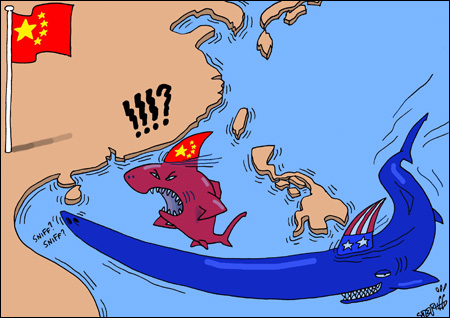Benjamin Shobert is the managing director of Teleos, a consulting firm that seeks to migrate new technologies into U.S. markets. He called me up a while back and we did an interview (lengthy), which appears on the front page of Asia Times online today, along with a very sophisticated book review--without a doubt the most sophisticated review of my intent as a writer that I have ever received.
I have grown so weary of style and personality reviews masquerading as actual content reviews. I know my stuff is very forward-leaning and thus controversial and not conventional and so I must be pigeon-holed by establishment types as "naive." Tellingly, Shobert is a managing director, like myself, so here I get something of a genuine peer review instead of some journalist or thunk tanker.
It is a great review in the sense that he truly explores my thinking and offers a translation that is full of genuine feedback--i.e., this is how I felt reading his stuff (instead of the usual, "this is how he transgresses my field!"). He seems generally favorable to the material, but he doesn't actually declare the book to be this or that in terms of praise. Instead, he says, this is what Barnett is trying to achieve and this is how, you, the reader, may likely interpret that.
Here is what clinched the review for me:
In this regard, his thoughts on China are compelling: if China was going to set aside its communist ways and re-enter the global economy, how else was it going to do so other than by becoming the world's factory? Did we expect it to go from a deeply withdrawn country, lacking industry and technology, with a chronic need to feed itself, to a nation competing on innovation in the space of a decade? Two? Barnett deeply wants Americans reading his book to wrestle with their own history, specifically when the US economy had its own predatory habits. By positioning much of his 12 steps within America's own challenges while it developed, Barnett hopes to introduce some maturity and patience into our expectations for China.
The first line is really fabulous. When I read the post-colon restatement of my thinking, I thought to myself, "Man, that is good! Did I write that?" Then I realized I hadn't and immediately became pissed with myself, wondering why I had missed an opportunity to include a line that good. But then I felt a real joy: here was somebody improving my thinking upon reading it in print. There is no greater feeling as a strategist than to see somebody run with your idea and better it. You made a connection, and it multiplied.
I am not a great review writer, but I think this is a great review, and I plan to use it as an inspiration for writing future ones.
Anyway, a very gratifying treatment. Interestingly enough (and quite telling), Shobert sent me a notice email and, at the end, he said he wanted to have dinner some time if we were still on speaking terms after I read the review. What does that tell me? It tells me that he felt he wrote something very honest and he wasn't sure how I would take it.
Again, that's a model review in my mind: you do an interpretation of material and you wonder if the author will find it on the mark or offensive, but the point is, you actually review the material--not the man, not the career, not the style, etc.
In short, this was a guy who wasn't intimidated by the material and showed it.
Permanent URL for the interview is here.
You can find the book review here.
Shobert also did a very nice job on reducing our long conversation to this short interview capture.
Here's the clincher: Shobert lives about five miles from me.
 Saturday, March 21, 2009 at 3:36AM
Saturday, March 21, 2009 at 3:36AM 










